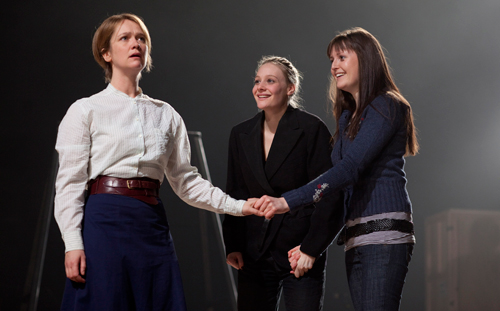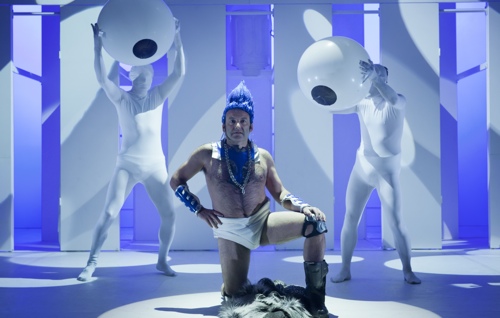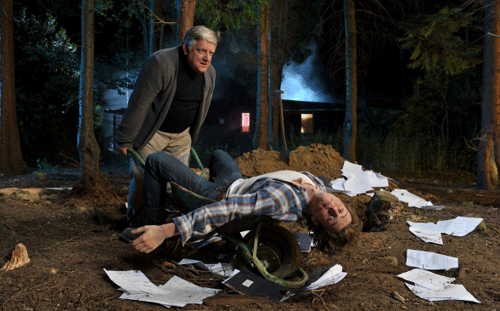
What was the impetus for choosing Three Sisters?
Chekhov’s Three Sisters is awash with references of sound, both literal and reflective. We are primarily a devising company, conceiving and creating shows from scratch. Whilst devising at the National Theatre Studio with Sean Holmes, we were inspired to look at how the Filter method could be applied to existing classic texts. It’s no accident that we decided to tackle three of the most prominent dramatists of all time – Brecht, Shakespeare and Chekhov. Filter’s method of exposing the process on stage (having sound designers, musicians, and often the stage manager on stage at the same time as the actors), worked well with Brecht’s didacticism in Caucasian Chalk Circle (National Theatre 2007).and Twelfth Night (RSC & Tricycle) is arguably the most lyrical of Shakepeare’s plays, making them rich pickings for an exploration of music, sound and text.
Your Twelfth Night, which ran at just 90 minutes and was a riot of music and comedy seemed radical and hugely inventive, Three Sisters was almost conservative by comparison. If we say that Twelfth Night unpacked and exposed the spirit of the piece and laid bare the very essence of the work, then is it right to say that Three Sisters unravels a stitch here and there and made the audience work harder?
Yes, I think that’s a very good way to describe the process of what we discovered during rehearsal for Three Sisters. Far from wanting to clutter Chekhov’s words with an over-complicated and over-illustrative sound design, we tried to make any sonic interventions as subtle and as organically linked to the text as we could. Every effort was made to simply highlight character, story and ambiance, rather than smother and demonstrate what is written. Chekhov was obsessed with sound. He writes very clearly where he wants sound to be in his plays, and we decided that many of his stage directions should be adhered to as rigidly as a musician might follow the composition of a piece of music. That’s not to say that there isn’t room for fresh invention in the composition. The aim is to highlight what the author is saying, but to give a new insight into what he or she means.
Is there a specific Filter approach?
Our approach differs slightly from project to project, depending on the nature of the beast. Initial decisions are taken by the Filter artistic directors – often alongside established Filter actors, directors, designers and sound designers. The process is then inspired by all the collaborators inside the rehearsal room.
Clare Dunne said she was really surprised that on Day One of rehearsal you bypassed the read through and put the text aside. How did that approach help you to understand the play?
With a classic text it’s all too easy to become hamstrung by textual analysis. Chekhov, or any other writer’s plays, are not stuffed museum pieces to be gawped at as ancient relics to be taken out and periodically re-animated for the approval of theatrical historians. They should be living, breathing, freshly-realised ventures, inspired by, not limited by, the period in which they were written. It’s perfectly reasonable to read about the period of the play, and it’s author, but Filter's interest lies in elucidating text, bringing it right up to date and uncovering it’s timelessness, not historically re-producing it. With this in mind we think it’s crucial to ally your gut instinct to your knowledge of the play, making it as human as possible. Many of the exercises and creative imaginings that we did on the first day of rehearsals set the tone for the whole of the run. Every actor should feel as if they own the plays’ themes and it’s story for themselves, and not simply following the director’s personal vision or concept. The one thing that we try to foster in the rehearsal room is having a sense of a shared ownership of the play.
Clare loved the phrase “Wrong is Strong” that was used a lot in rehearsal – I imagine that could be really liberating for a company or quite frightening?
“Wrong is strong” is a way to open up the imagination to anything being creatively possible. Often the silliest or strangest moments in life are bizarre and unbelievable. If you go too far in one direction, say, with your character, you can always pull it back to what it should be later.
I’m glad that we didn’t serve the play up to you on a plate! I think if performances in a play are too demonstrative, or the music too illustrative, then it’s patronising to an audience.
We talked a little bit about how far you've come as a company towards this realisation of Three Sisters. Do you think you've achieved what you set out to do?
I think we have done as much as we could have done in the short rehearsal period that we had, but I would hope that the actors keep trying to release the play a little more every time they perform it. We try to give them the freedom to manoeuvre and experiment in this regard. I would hope that the next time we tackle Chekhov, or any other classic text, we would be doing it with a wiser head on our shoulders!
I felt I had to work quite hard as an audience member during this show, but that the rewards were greater. Is that a usual response?
I’m glad that we didn’t serve the play up to you on a plate! I think if performances in a play are too demonstrative, or the music too illustrative, then it’s patronising to an audience. As an audience member I don’t want to be told what to feel and when. With Three Sisters, it’s the social aspect of the piece, as well as the characters’ own thoughts and feelings, that is the key to the meaning of the play. If you collectively grasp what the right questions arising from the play are, then you are serving the intentions of the playwright, and not just the actors’ individual thoughts or obsessions as to how they might they might interpret the play.
The translation is fantastic – did that help with the work you did in rehearsal?
Christopher Hampton’s translation is very good. Light, modern touches, whilst retaining the heart of Chekhov’s original translation. In a way the translation is a reflection of the Filter methodology.
I couldn't help but notice that the audience were very young – that must be incredibly rewarding for you?
We do we have a young following, and that’s superb. We are very happy about that, but we don’t go out of our way to just attract young audience members. We want audiences with people of all ages. In general, we love to make theatre for people who might not ordinarily go to the theatre, and shows that we would like to see ourselves.
It's quite a youthful company in many respects – do you enjoy working with younger actors?
We love working with anyone who still has a burning ambition to create. Many of our long-time collaborators happen to be (still) quite young, but that’s never stopped us working with older collaborators.



Be the first to comment